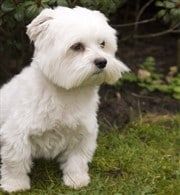Maltese Breathing Problems
Overview
Difficulty breathing, also referred to as dyspnea, can result from a number of conditions. While symptoms will vary depending on the cause, dyspnea typically involves at least one of the following:
- Increased effort to breathe - breathing is labored, a dog may physically show that he is exerting effort to pull in air
- Noisy breathing - rasping noises, wheezing, or other unusual sounds
- Cyanosis - a bluish tinge to the lips and/or mucous membranes which shows that a dog is not receiving enough oxygen
Aside from this, a dog may be coughing and/or gagging. Episodes may be acute or chronic, and may be short-lived or have a long duration.
This section will cover the most common reasons why a Maltese may have trouble breathing.
Allergies
If a Maltese has breathing issues that are related to allergies, his symptoms may worsen when outside, particularly during high pollen count times and/or while exercising; however, the same can be said for other conditions.
Depending on whether or not the house is guarded against allergens (running central air with a HEPA filter, using portable air filtering devices, having everyone remove shoes after coming indoors, rinsing off the Maltese's paws after coming in, etc.), breathing issues may or may not clear up once the Maltese is back inside.
Read more
about Maltese allergies
Asthma
Overview: Asthma, referred to as allergic bronchitis in regard to canines, is a condition closely related to environment airborne allergies.
Once a trigger is inhaled, it causes an obstruction of the airways in which the bronchi (the air passages in the lungs) fill up with mucous and go into spasms (bronchoconstriction).
Symptoms: Dogs of any age can develop asthma; however, it occurs more frequently in middle-aged dogs and senior dogs. And, this happens more often to smaller breeds than larger ones.
The main signs of canine asthma are coughing, wheezing, and/or open-mouth breathing in which the dog is clearly struggling to inhale and exhale.
In some cases, signs may also include cyanosis (gums and/or tongue turns blue due to lack of oxygen), weakness, and/or loss of appetite resulting in marked weight loss.
Symptoms may come and go, only appearing when a dog is within an environment with the trigger(s).
Chronic, long-term asthma can lead to damage of the tissues of respiratory tract.
Causes:
As touched on above, this is almost always related to an inhaled allergy. The most common culprits include second-hand smoke, dust, air pollution, chemical aerosol sprays, heavy perfumes and other strong fragrances, pollen, weeds, and other seasonal airborne triggers.
Diagnosis:
Tests may include x-rays of the chest, tests to rule our heartworms, CBC, and in some severe cases, bronchial lavage
Treatment:
Medicines may include steroids, antihistamines,a bronchodilator, and antibiotics. In severe attacks, oxygen therapy may be necessary.
Suspected triggers of the dog's asthma will need to be decreased or eliminated if possible.
Prognosis: This often is controlled as opposed to being treated. However, prognosis is very good as long as an owner continues to give medication. When on regimented medications, most dogs with asthma can normal lives.
Collapsed Trachea
This is a condition in which the tracheal rings that surround a dog's windpipe collapse inward, causing obstruction and defined breathing issues.
It may present at all times, or it may flare up when the dog gets excited or is exercising. Pressure on the neck can make this worse; therefore, if a Maltese is on leash and collar, his breathing issues and/or coughing may worsen.
A dog may wheeze and/or have a peculiar cough that could be described as a honking noise.
Read more
about Maltese collapsed trachea
Reverse Sneezing
Overview:
These are spasms that cause a dog to quickly pull air in through his nose (the opposite of a sneeze). A Maltese may have a random reverse sneeze or episodes lasting anywhere from one minute to ten.
Signs: An episode of reverse sneezing can be startling to see and hear. With each quick pull of air into the nose there will be a loud snorting noise. Many dogs will fully extend their necks with each rapid inhalation.
Causes: The exact cause of these are unknown; however, it is very common with canines. For some dogs, episodes can be triggered by inhaling certain elements including rug cleaner, colognes, cleaning products, etc.
Treatment:
Since reverse sneezing can be confused with coughing, signs of collapsed trachea, or other breathing issues, it is recommended to video your Maltese during one of these breathing attacks to document the event and to show the recording to the veterinarian.
If it is indeed a case of reverse sneezing, usually it does not require medical intervention. However, if episodes occur frequently and/or are prolonged, anti-inflammatories, antihistamines and/or decongestants may be prescribed.
What you can do during an episode:
If your Maltese is having a problem with reverse sneezing, there are some things that you can do to try and stop them. These all involve doing something to interrupt the spasms (a similar approach to stopping hiccups).
A)
Gently cup your hand over your Maltese's mouth, allowing room for breathing. Since excess carbon dioxide is expelled during reverse sneezing, this can help as it causes a dog to breath more back in, restoring it to proper levels.
B)
Place a small dab of all-natural smooth peanut butter to the tip of your dog's nose. When he licks it off, the act of extending his tongue can be enough of an interruption to make the spasms cease.
C)
Gently massage the front of his throat with long downward strokes. This can help surrounding muscles relax.
D)
Offer a small treat. Chewing and swallowing can sometimes be enough to make them stop.
Other Possible Causes
There are other less common but possible reasons why a Maltese may have trouble breathing, including:
- Foreign object stuck in the throat
- Pneumonia infection
- Heart failure
- Enlarged heart
- Bronchi infection
- Trauma to the chest
- Enlarged liver
- Bloat
- Medication reaction
Are You a Member Yet?
Become a free PetMaltese Member
- This will allow you to receive a friendly reminder when new pages of Maltese info are added to the site. You will also be able to submit photos of your adorable Maltese to be added here, and be able to suggest a topic for us to write about.

-min-450x169-480w.jpg)


-min-180x187-344w.jpg)

